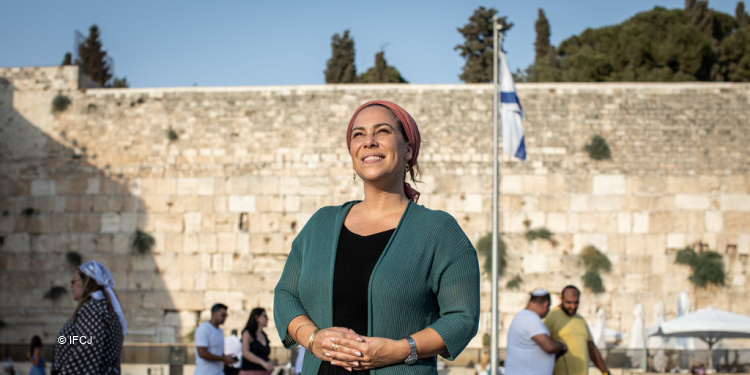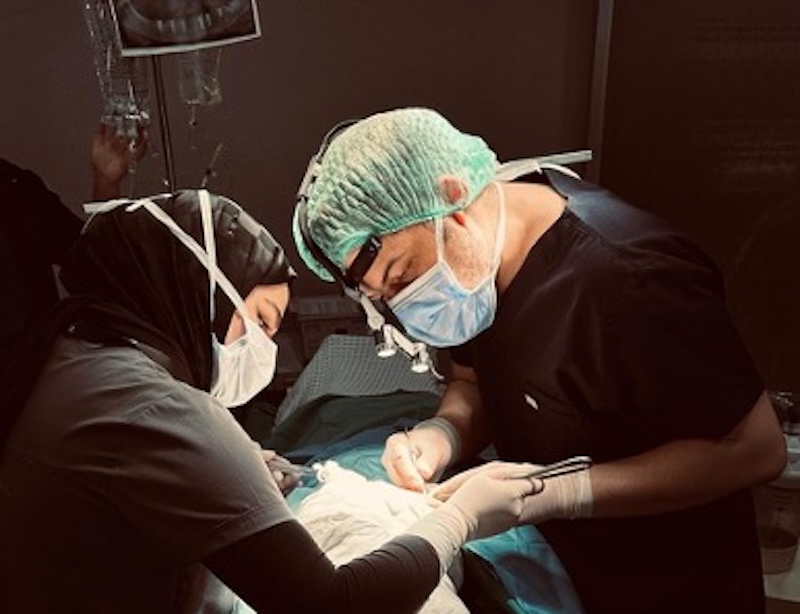Branded Content by Cosmic Press
Yael Eckstein, President and CEO of the International Fellowship of Christians and Jews (also referred to as IFCJ or The Fellowship), oversees all ministry programs and serves as the international spokesperson for the organization.
Prior to her present duties, Yael Eckstein served as Global Executive Vice President, Senior Vice President, and Director of Program Development and Ministry Outreach. Based in Israel with her husband and their four children, Yael is a published writer and a respected social services professional.
Yael Eckstein has contributed to The Jerusalem Post, The Times of Israel, and other publications, and is the author of three books: Generation to Generation: Passing on a Legacy of Faith to Our Children, Holy Land Reflections: A Collection of Inspirational Insights from Israel, and Spiritual Cooking with Yael. In addition, her insights into life in Israel, the Jewish faith, and Jewish-Christian relations can be heard on The Fellowship’s radio programs and her podcasts.
Yael Eckstein has partnered with other global organizations, appeared on national television, and visited with U.S. and world leaders on issues of shared concern. She has been a featured guest on CBN’s The 700 Club with Gordon Robertson, and she served on a Religious Liberty Panel on Capitol Hill in May 2015 in Washington, D.C., discussing religious persecution in the Middle East. She was also featured as the cover story of Nashim (Women) magazine in May 2015. Her influence as one of the young leaders in Israel has been recognized with her inclusion in The Jerusalem Post’s 50 Most Influential Jews of 2020, 2021, and 2023, and The Algemeiner’s Jewish 100 of 2019. She was named a winner in the 10th Annual 2022 CEO World Awards®, and received The Jerusalem Post’s 2023 Humanitarian Award.
Born in Evanston, Illinois, outside of Chicago, and well-educated at both American and Israeli institutions – including biblical studies at Torat Chesed Seminary in Israel, Jewish and sociology studies at Queens College in New York, and additional study at Hebrew University in Jerusalem – Yael Eckstein has also been a Hebrew and Jewish Studies teacher in the United States.
Below, Yael Eckstein offers a glimpse into a time-honored biblical practice rooted deeply in Jewish tradition. This practice, which Jesus himself may have observed, occurs during the Hebrew month of Elul, which immediately precedes the High Holy Days. As the Jewish community gears up for the High Holy Days, which start with Rosh Hashanah and culminate in Yom Kippur, they embrace a profound 30-day challenge. This period is dedicated to intense spiritual introspection, offering an opportunity to connect deeply with God and establish lasting spiritual enhancements. Yael elucidates how this month-long spiritual recalibration can significantly influence the quality of the upcoming year and the entirety of our lives.
What is the 30-day challenge?
YE: It’s a 30-day program to take our spiritual lives to the next level as we enter the new year on the Jewish calendar. We’ll start with some verses in the Bible that make an unusual requirement of about 30 days, and I’ll show you how this mysterious directive gives us the key to unlocking our potential and changing our lives.
The verses I want to explore with you discuss the laws about marrying a woman taken captive in war. They’re Deuteronomy 21:10-13, which says, “When you go to war against your enemies and the Lord, your God delivers them into your hands and you take captives, if you notice among the captives a beautiful woman and are attracted to her, you may take her as your wife, bring her into your home, and have her shave her head, trim her nails, and put aside the clothes that she was wearing when captured. After she has lived in your house and mourned her father and mother for a full month, then you may go to her and be her husband and she shall be her wife.” These verses give permission to an Israelite soldier to marry a woman taken captive in war as long as certain conditions were met. These conditions included a 30-day waiting period from the time the woman was captured to the time that the Israelite soldier could marry her.
Why is the 30-day waiting period necessary?
YE: Of course, these laws don’t apply to us in the exact way that they once did, since we don’t take women captive in war anymore. But God’s Word is eternal, which means that there are still meaningful lessons within these verses that are relevant to our lives today. Over the centuries, Jewish Bible scholars suggested different reasons for why the 30-day waiting period was necessary. One opinion explained that it takes 30 days to change a habit, and so 30 days were necessary for the woman to purge herself of all of her idolatrous ways. After 30 days of change, she can marry into God’s people. This is such a useful bit of truth. According to this teaching, it takes just 30 days to make a significant change. If we can stick to something for just one month, we can make a real impact on the rest of our lives.
Sometimes we shy away from trying to make a significant change in our lives because it just seems too overwhelming. Other times we try to make a big change overnight. We say things like, I’m going to lose 40 pounds in two weeks, or I’m never going to yell at my kids again, ever. But those changes made on a whim never last. Our verses teach us that there is an optimal amount of time for making realistic changes in our lives, and that if we do it right it’s completely doable. All it takes is 30 days. It’s enough time to make a meaningful change and short enough to make our goals attainable. I think that this is the reason why 30-day challenges are so popular right now. Keeping to that time frame empowers people to make incredible changes. It’s the same wisdom that’s been in the Bible for thousands of years and it’s helping so many people today.
What is the 30-day challenge Jewish people participate in every year?
YE: In the fall, the Jewish people celebrate the High Holidays, which begin with Rosh Hashanah, the Jewish New Year, and end with Yom Kippur, the Day of Atonement. The entire month before these Holy Days is actually designated as a time for introspection and change. This month on the Hebrew calendar is called Elul and during Elul, we take 30 days to upgrade our spiritual lives before the new year begins.
What does Elul mean to you?
YE: According to Jewish tradition, Rosh Hashanah marks the anniversary of the creation of the world. It’s the world’s birthday. It’s a time to celebrate, but of course, it’s also a time to evaluate. In the same way that we need to have an annual checkup of our physical health, we need to have an annual check-in to support our spiritual health. Taking this time to reflect on our lives helps us stay on the right path, headed in the right direction. If we don’t make this time it’s easy to find ourselves way off track later down the line and by then it’s so much harder to get back on track. I learned this the hard way one time on a family hike.
My husband and I love to take our four kids on hikes through the beautiful land of Israel that we are blessed to call home. One time we were about halfway through a long trail somewhere in Galilee when my daughter told me that she needed a bathroom badly. My husband Amichai estimated that we had about a half an hour left on our hike, so we told our daughter that we would be there soon and we tried to distract her with a game of “I Spy” as we kept on going. But a few minutes later, my daughter asked for the bathroom again, and this time we couldn’t really distract her. We realized that we needed to walk faster and get to the bathroom as quickly as possible.
We got the kids to pick up the pace and we were covering a lot of ground when all of a sudden Amichai stopped. He said, “Something doesn’t seem right. The trail ends at the top of the mountain, but we’ve been headed down the mountain for a while.” He climbed up on some rocks, and from that vantage point he was able to see that we had made a wrong turn a few minutes earlier and that we were headed in the wrong direction. That’s not something you want to hear when your seven-year-old needs a bathroom badly. It was frustrating that we had to double back when we were already in a rush, but I also realized that it could have been a lot worse. Had Amichai not stopped us when he did, we would’ve ended up a lot further from where we needed to be. Thankfully, we still made it to the bathroom in time and I learned two really important lessons that day.
The first is to always make sure that young children use the bathroom before starting a long hike, even if they insist that they don’t have to! And the second lesson I learned is that it’s a good idea to stop every once in a while in order to assess where you are, where you want to be and in which direction you are headed. Not to just go on autopilot.
This is what the month of Elul, the time immediately before the High Holy Days, is all about. It’s taking time to pause, to look at where we are headed, and to make any necessary changes to get back on track. If we don’t do this at least once a year, then one day we might find ourselves completely lost and far from where we even wanted to be.
What is one way to check in with your spiritual health?
YE: One of the things that the Jewish people do to make sure that we take stock of our lives at least once a year is to blow the shofar, the ritual trumpet mentioned in the Bible. We blow it every day during the month of Elul. The sound of the shofar is like an alarm. My father used to call it God’s alarm clock. Its purpose is to wake us up from the spiritual slumber that we fall into during the year so that we become aware of where we are spiritually and what we might need to change. We blow the shofar every day for a month before the Jewish New Year because change doesn’t happen overnight. It’s a process that takes some time, and if we wait until Rosh Hashanah, it may be too late.
Why is the month of Elul so important for change?
YE: I grew up in Chicago and I remember all the hype around making New Year’s resolutions for the new year on January 1st. There were always ads for gyms and weight loss programs that time of year because everyone wants to change for the better in the new year. People make all kinds of resolutions on December 31st, but how many people are still keeping their New Year resolutions on January 31st or July 31st? Lasting change doesn’t happen overnight. True growth is a gradual process, a process that happens over time. The process, as the Bible says, happens over a month and the month of Elul gives us enough time to lay the groundwork for real and lasting change.
What does the Jewish tradition mean when it says to ‘plow the fields’ during the month of Elul, and how can this concept be related to our personal growth and inner well-being?
YE: According to Jewish tradition, every day during the month of Elul, a heavenly voice calls out, “plow the fields. Do not plant for the thorns and weeds.” What does this mean? It means that we need to tend to our inner garden during the month of Elul so that the seeds we plant for the new year will grow and thrive all year round. I love this analogy because I love to garden.
Outside my house here in Israel, I have a small garden with a vegetable patch. When we bought the house, it was all just sand and it was my dream to grow amazing healthy food that my family can eat. Now, I am so blessed. My family grows kale, zucchini, tomatoes, lettuce, and cucumbers. It is such a joy for me and for my children to plant seeds and watch them grow into big and beautiful vegetables that we can then enjoy. But it wasn’t always like that.
When I first started gardening, I thought that it was as simple as putting some seeds in the earth and giving them water, but I quickly learned that it takes much more than that. The soil has to properly be prepared in order for the seeds to thrive, and if I’m not clearing out the weeds at least once a week, they’ll take over.
One time when I was reading an article about gardening, I came across the following line, “A garden is a reflection of the quality of its soil.” The author explained that most gardeners skip the step of preparing their soil properly. As a result, their gardens don’t reach their full potential. When I read that line, a light bulb went off in my head. I realized that the same idea applies to human beings. The quality of our inner environment determines if and how we’ll be able to grow and reach our potential. It’s the soil, the preparation, and of course constantly picking those weeds to make sure it’s the fruit that has the focus and all of the nutrients from that soil. The spiritual call to plow the fields and not to plant for the thorns and weeds is a call to remove anything negative from our lives and to add nourishment, positivity, and anything that will help us thrive.
When it comes to a physical garden, we need to spend time getting rid of weeds and thorns. Otherwise, no matter what we plant, the weeds and thorns may take over. In the same way. When we set goals for the new year, first, we need to remove the weeds and thorns of our lives, the false beliefs, the self-defeating behaviors, and anything that separates us from God. Anger, and holding a grudge, are the weeds and thorns that we need to get rid of both while preparing the soil and even throughout the year. If we don’t do this critical work, these weeds and thorns can smother all of our other goals, but when we remove them as best as we can, we set ourselves up to succeed in every one of our goals.
What should one focus on during the month of Elul?
YE: These 30 days of Elul are a time to ask ourselves some important questions, like what bad habits are holding me back from what I want to be, and what do I need to remove from my life because it is holding me back spiritually? It can be intimidating to think about staying away from gossip forever or getting rid of anger permanently, but can you do it for just 30 days? That’s enough time to make a significant change. Getting rid of behaviors and beliefs that harm us is one aspect of preparing our inner garden during Elul. The other is nurturing and nourishing our spirit so that our inner environment is conducive to growth.
During the month of Elul, Jews set aside more time for Bible study, prayer, and developing our relationship with God. For me personally, this means spending more time in the fields that surround my home. I call this my time with God. I walk with Him, I talk with Him, and I listen for what He lays on my heart. My husband and I also get together with friends at least one night around this time of year to play musical instruments and sing soulful biblical songs. There are always events happening in our community and all around Israel during Elul – inspiring lectures, special prayer services, soulful concerts, and the spiritual nourishment that we gain during this one month carries us all year long. And the month of Elul can be a meaningful and sacred time for Christians, too.
Can you tell us a story of the significance of Elul in a particular spiritual journey?
YE: I want to tell you about my friend Michele Bachmann, who is a former congresswoman, a proud Christian, and a great friend to Israel and the Fellowship.
A few months ago, Michele told us how four years ago she decided to dedicate the month of Elul to God. For the 30 days of Elul and also the 10 days afterward until Yom Kippur, the Day of Atonement, Michelle focused on fasting and prayer. She focused on her spirit, on setting up her garden, and the soil of her garden, so it would be healthy. For her, that meant giving up coffee, sugar, and meat and spending personal time with God. Michelle told us how after the first year that she did this, she saw miracles that she could have never imagined. She also said that one year that she didn’t do this, she didn’t see as many blessings in the year that followed. Michelle said that now she’s fully committed to setting aside this time for God every year. She believes, as do I, that it lays the groundwork for a year full of miracles and incredible blessings, and we’ve seen it in our lives to prove it.
How can Elul impact one’s spiritual growth and future blessings?
YE: The month of Elul is like a 30-day challenge that upgrades our souls and elevates our lives. And like all 30-day challenges, if we invest these 30 days correctly, they will pay off huge dividends for the rest of our lives. In Lamentations 3:40, we read, “Let us test and examine our ways, and return to the Lord!” This is the call of Elul: to examine where we are in our life’s journey and to take steps in the right direction. I hope that you will join the Jewish people whenever you are listening to this and heed that call. When you take 30 days and dedicate them to God, you set yourself up for a successful year and a blessed life.
Branded content furnished by our promotional partners. The Daily Sundial editorial staff is not involved in its production. Content does not reflect the views or opinions of the editorial staff.








